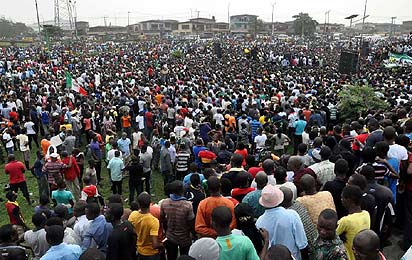Fuelling the Pains of the People
Jan 21, 2015
Story

While the whole world awoke on January 1st in the New Year with hope for 2012, Nigerians were hit with a shock by the government. The government was implementing the full deregulation of the downstream oil sector by removing fuel subsidy on the cost of PMS (Petroleum Motor Spirit) i.e. petrol/gasoline. This resulted in an increase in the cost of petrol per litre from N65 ($0.40) to between N138 ($0.86) and N200 ($1.25).
While the cost of petrol in Nigeria appears small it is important to note that Nigeria is one of the largest producers of crude oil in the world, a member of OPEC and should be able to provide low cost petroleum products to its citizens. Also, the change in price is astronomical as it is over 100% and painful in a country where the minimum wage was recently increased to N18,000 ($112.50) per month.
Necessity or Unnecessary
There have been many arguments for and against the removal of the fuel subsidy. I do not wish to rehash those here. Please visit: Naijablog – “The Fuel Subsidy Removal Protests for Dummies” http://bit.ly/xUNnaI; Aljazeera, “#OccupyNigeria? Thousands protest fuel subsidy removal,” http://bit.ly/zEclHg; Ifeanyi Onuba (PUNCH) “Subsidy removal: Nigerians won’t suffer in vain — Okonjo-Iweala”, http://bit.ly/xRSxmq; NigeriaFirst.org, “President Jonathan’s national broadcast on the deregulation of the downstream petroleum sector,” http://bit.ly/AjUHmy; for details on the issue.
I am saddened by the whole process and the implementation of this policy. It further increases the pains of the people, as they are forced to live in austere conditions while political office holders have excessive and unbelievable salary packages. We ask, how do you justify bloated recurrent spending by government which leaves little for infrastructural development for the needs of the people?
Demanding people bear costs and the insensitivity at a time when we are facing the greatest security risk in Nigeria’s history is astonishing. The Boko Haram fanatical Islamic sect that has been responsible for bombings and killings in Nigeria has not been contained. On Christmas day, 25 December 2010, they bombed a Catholic Church in Madalla, Niger State, a city not to far from Abuja, Nigeria’s capital city. (See “Jonathan visits Madalla, says ‘cancerous’ Boko Haram wants to kill Nigeria” Vanguard News Online http://bit.ly/y7hNAI; “December 2011 Nigeria bombings,” Wikipedia http://bit.ly/A5jl9a). The government has not effectively dealt with Boko Haram and there is general apprehension about where they would strike again.
The National strike which started on Monday 9 January 2012 and the simultaneous protests taking place in several cities in Nigeria is evidence of people’s dissatisfaction with the government. Today, 10th of January 2012 is Day 8 of the #OccupyNigeria protests and Day 2 of the National General Strike announced by the Nigerian Labour Congress (NLC) and Trade Union Congress (TUC). The protests send a strong message to the government that Nigerians are fed up of government inadequacies and incompetence in managing the socio-economic affairs of the country.
Immediate Effects of Removing Fuel Subsidy
The effects of the fuel hike since January 1st were felt immediately. The cost of transportation went up by 100%. On average I spend about N3,000 ($18.75) for 46 litres of fuel per week for my car. I bought N4,000 ($25) at N141 per litre of fuel on Friday, 6 January 2012 for 28 litres of fuel and of course my tank was not full. I would need to spend at least N6,486 ($40.54) per week to get to work at the new rate. My Colleague spent N400 ($2.5) instead of N200 ($1.25) for her bus fare to get to work. This means she would now spend at least N800 ($5) per day on transport. Our salaries have not increased but we would spend more to get into work. Eventually, we would also spend more money on food and other items as the cost of transportation creeps up.
The price increase came at a time when families were just recovering from celebrating the Christmas and New Year holidays. It is a tradition in many parts of Nigeria, for city dwellers to travel to the villages to visit relatives and many people travelled in December 2010. Travelling back now became a big problem as cost of transportation was affected by removal of fuel subsidy. It was reported that in Abia State, “some people who…are now stranded in their villages have resorted to selling their belongings to raise transport fare back to their various stations” (“Stranded Passengers in Abia Sell Belongings to Raise Fares” Anayo Okoli – Vanguard Newspapers, Friday Jan 6, 2012, p.13).
The pains of coping with the fuel subsidy removal are also compounded by the lack of access to essential services. A major problem in Nigeria is poor electricity supply. Nigeria is a country with vast natural resources yet cannot supply electricity to its 150 million inhabitants 24/7. This means that we supplement lack of regular and sufficient electricity supply with generators. People that have generators need fuel to run it and generate energy for use in their homes. Many SMEs (Small and Medium Enterprises) use generators to run their businesses. Larger organisations use bigger and industrial generators. The limited provision of electricity has been linked to the cost of doing business in Nigeria and is one of the factors destroying local businesses and industries.
Gender Perspective on the Fuel Subsidy Removal Policy
Moreover, the fuel subsidy removal policy did not evaluate the effect on gender relations and women in particular. Women are the main carers of their families. The task of managing resources and feeding the family are traditionally vested in women. Managing the current increase in fuel and the cost of looking after a family would increase stress and strain. This can have adverse effect on women’s health.
Personal security is also a major issue. When people cannot provide basic necessities of life, there is a temptation to steal and risk of violence. Women all over the world bear the brunt of violence when it breaks out. Violence effectively prevents women from participating effectively in the workplace and at home.
When organisations overheads increase and profits drop, they may cut down on the number of employees. Statistically, women are more likely to be laid off than men in employment. Correll at el. found that actual employers discriminate against mothers when making evaluations that affect hiring, promotion, and salary decisions, but not against fathers.
School fees are likely to increase as well. Many working women who enrol their infants in crèches and nursery schools may in an attempt to reduce cost decide to stay home and home school their children to a certain level before they join the school system. This may have a long term effect on a woman’s career because the longer you stay out of formal employment, they harder it is to get back in. Some women may never return back to work.
Still the Problems Remain
In addition, health care would deteriorate as more people would choose self-treatment rather than go to a hospital. The public hospitals in many States are not completely free and health insurance covers only a small number of people. There are many major roads linking towns and cities that are badly maintained and begging for attention. Public education facilities are currently at their lowest. There is high youth unemployment, high infant and maternal mortality rates. Terrorist attacks are increasing. These problems are a contrast to the increase in government expenditure and rapid economic growth witnessed in the last five (5) years. We live in dangerous times when people do not trust their government and persons elected to serve the people are perceived as not practicing good governance and transparency.
So many things are not working right here. Three main issues, in my opinion, need to be urgently tackled: Corruption, Bad Governance and Religious Intolerance. If these can be resolved, it would lead to greater accountability, visionary leadership and respect for fundamental rights and freedoms.
One of the arguments of the government and supporters of the fuel subsidy removal is that the current state of subsidy is enriching a cabal that use money gained from the fuel subsidy to fund their private interests. They argue that the funds generated from the removal of fuel subsidy would be used to develop the country, create jobs, improve health services, strengthen transportation services including building railways, maintain roads etc.
Only one question comes to my mind: Would removal of fuel subsidy replace one thief with another?
Further Information:
To follow developments on the Fuel Subsidy protests and debates on twitter please use the hash tag #fuelsubsidy #OccupyNigeria




